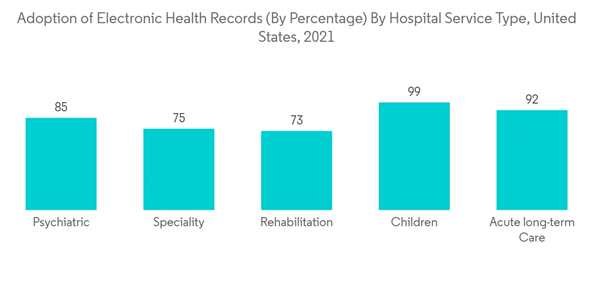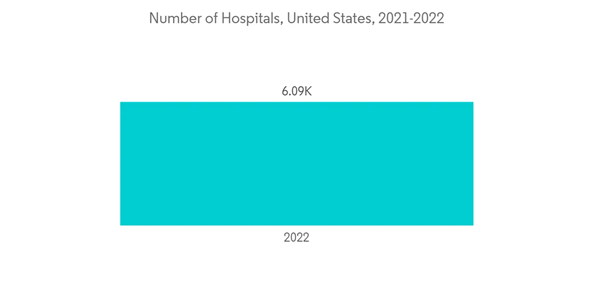The COVID-19 outbreak had a significant impact on the market over the pandemic period. A profound impact on the electronic medical records market was observed, and health information systems were designed to track the rising number of Covid-affected patients and related diagnostics. Under these circumstances, the market players focused on the development and introduction of healthcare information systems, thereby impacting the market growth. For instance, in December 2021, the LigoLab Information system provided fully integrated and automated laboratory information system support for client laboratories in California, Washington, and New York that were using FDA-approved instruments to perform high-volume COVID-19 tests. Thus, the introduction of various advanced healthcare information exchange systems in the United States for COVID-19 data management had a notable impact on the growth of the market. In addition, the demand for healthcare information exchange in the United States is expected to remain intact due to the emergence of various mutant strains of the SARS-CoV-2 virus, thereby contributing to the growth of the market over the forecast period.
The main factors driving the market growth include increasing investment in healthcare technology advancements, government support via various programs and incentives, and reduction in healthcare costs and improved efficacy.
For instance, according to the Public Health Information and Technology Infrastructure Modernization Funding Report in 2022, the Healthcare Information and Management Systems Society (HIMSS) released a report recommending a 10-year investment of USD 36.7 billion in public health infrastructure modernization to ensure readiness for ongoing and emerging public health emergencies. Also, the investment included USD 25.6 billion for immediate State, Territorial, Local, and Tribal (STLT) public health data infrastructure and USD 11 billion for public health interoperability and sustainability.
In another instance, in April 2022, California launched its long-awaited state-wide health information exchange (HIE) to improve patient data sharing between payers and healthcare providers throughout the state. Similarly, in May 2021, Connecticut launched its state-wide health information exchange to streamline patient data exchange across the state in the United States.
Moreover, the launch of various advanced healthcare information exchange systems by various key market players is expected to contribute to the growth of the market. However, huge initial infrastructural investment, slow return on investment, and data privacy and security concerns are expected to restrain the growth of the market over the forecast period.
US Healthcare Information Exchange Market Trends
The Decentralized/Federated Model is Expected to Hold a Notable Market Share Over the Forecast Period
The decentralized/federated model segment is expected to hold the largest market share during the forecast period. In this federated model, each healthcare provider is responsible for maintaining the records of their patients. The main function of the HIE is to facilitate the providers in exchanging patient records among themselves when the need arises. The salient distinction of a federated model is that there is no central database in which a previously compiled, comprehensive medical record is stored and can be downloaded. The biggest advantage of this model is a low chance of conflict based on ownership and compartmentalization of data. This credits the model with being less vulnerable to theft. It also boasts lower implementation costs when compared to other models, leading to high adoption rates.The market is projected to flourish further due to the higher adoption of digital healthcare, such as electronic health records in the country, and the rising investments by companies. For instance, as per the data published by the Department of Health and Human Services in 2021, nearly 78% of office-based physicians and nearly 96% of non-federal acute care hospitals adopted certified electronic health records.
Moreover, increasing investments by market players' activities for the development of decentralized healthcare information exchange systems are expected to drive the growth of the studied segment. For instance, in November 2021, Medicon Technologies Inc., creator of the decentralized health information network, raised funding of over USD 21.8 in a Series B financing round. The company used this investment to expand operations in its healthcare platform.
Workflow Management is Expected to Hold Notable Share in the Market Over the Forecast Period
Workflow management systems are expected to help healthcare businesses with their daily tasks and processes while lowering human errors and simultaneously augmenting revenues. Other advantages of workflow management systems are real-time tracking, integrated processes, less consumption of energy, and consolidated data centers. The factors expected to contribute to the growth of the studied segment are the rising number of healthcare centers, the increasing adoption of advanced workflow management systems in the United States, and the presence of key market players.For instance, American Hospital Association (AHA) statistics published in 2022 showed that there were 6,093 active hospitals in the United States in 2022.
Also, rising market players' activities, such as collaborations, partnerships, and others for the development of advanced workflow management, are expected to boost the growth of the market over the forecast period. For instance, in October 2022, Indiana-based Methodist Hospitals partnered with cloud solution company Infor to create a cloud-based healthcare application that will allow the healthcare system to standardize key processes in various areas, such as finance, human resources, supply chain, and operations.
US Healthcare Information Exchange Industry Overview
The United States healthcare information exchange market is competitive and consists of several major players. Due to high adoption rates of new technology and the wide availability of reimbursement, which necessitates the use of information exchange systems, the United States is at the forefront of healthcare information exchange implementation. Thus, nearly all the global players are operating in the country. Companies like Cerner Corporation, Allscripts Healthcare Solutions, Mckesson Corporation, Eclinical Works, and Epic Corporation Inc. hold substantial market shares.Additional Benefits:
- The market estimate (ME) sheet in Excel format
- 3 months of analyst support
This product will be delivered within 2 business days.
Table of Contents
Companies Mentioned (Partial List)
A selection of companies mentioned in this report includes, but is not limited to:
- Cerner Corporation
- Allscripts Healthcare Solutions Inc.
- Mckesson Corporation
- Eclinical Works
- Conifer Health Solutions
- Nextgen Healthcare Information Systems LLC
- Infor Inc.
- Optum Inc.
- Medicity Inc.
- Epic Corporation Inc.
- mpro5
- Newgen Software Technologies










